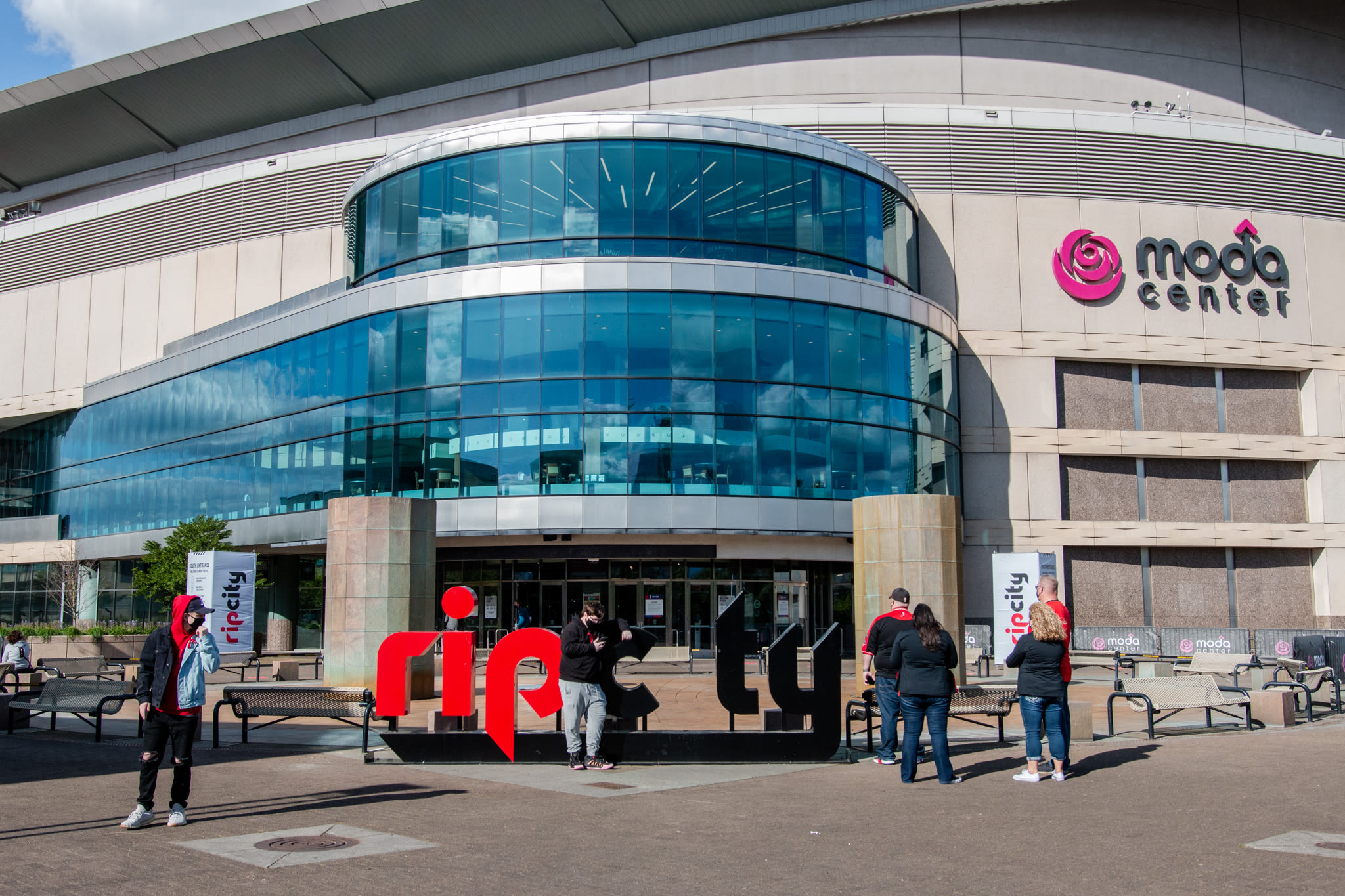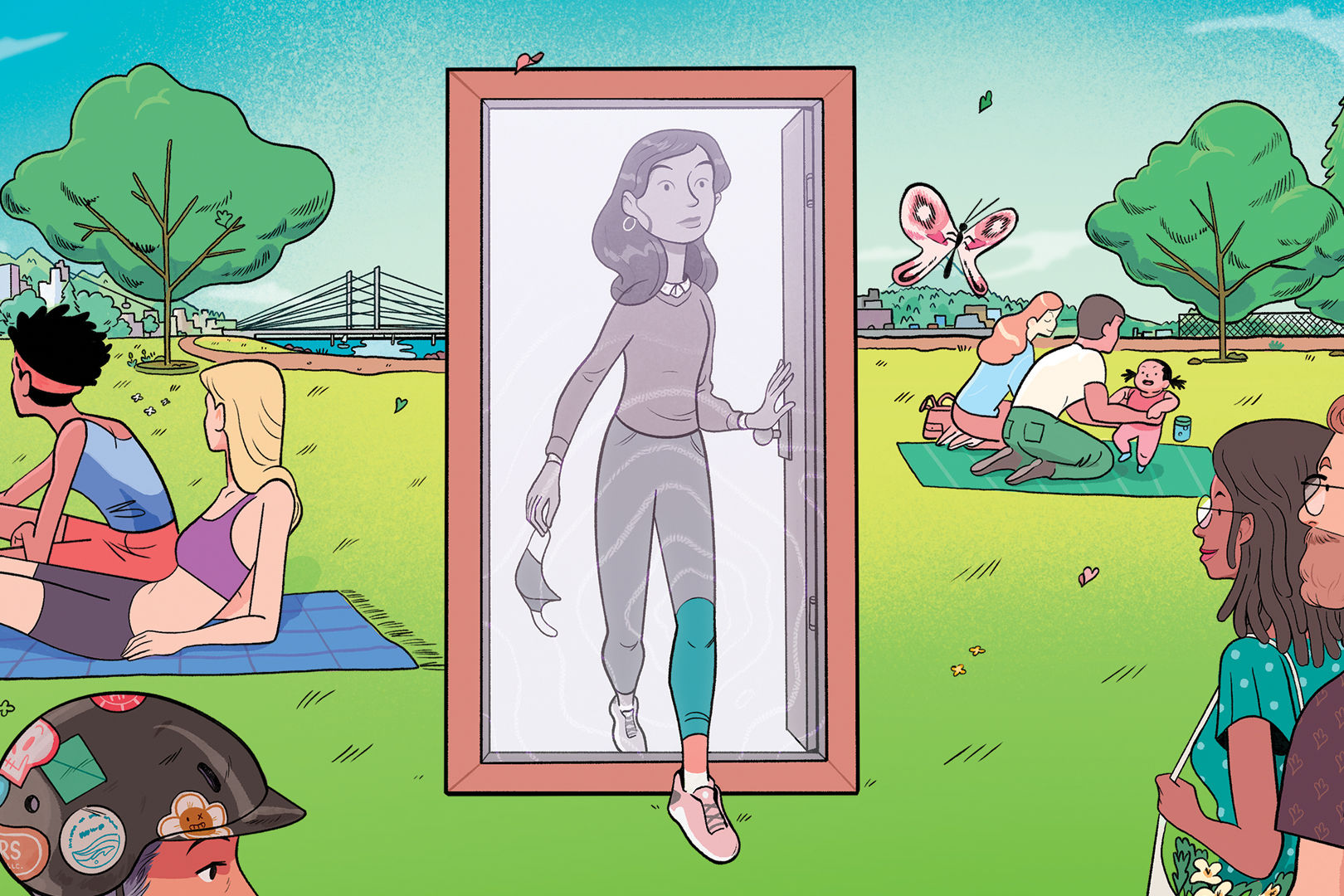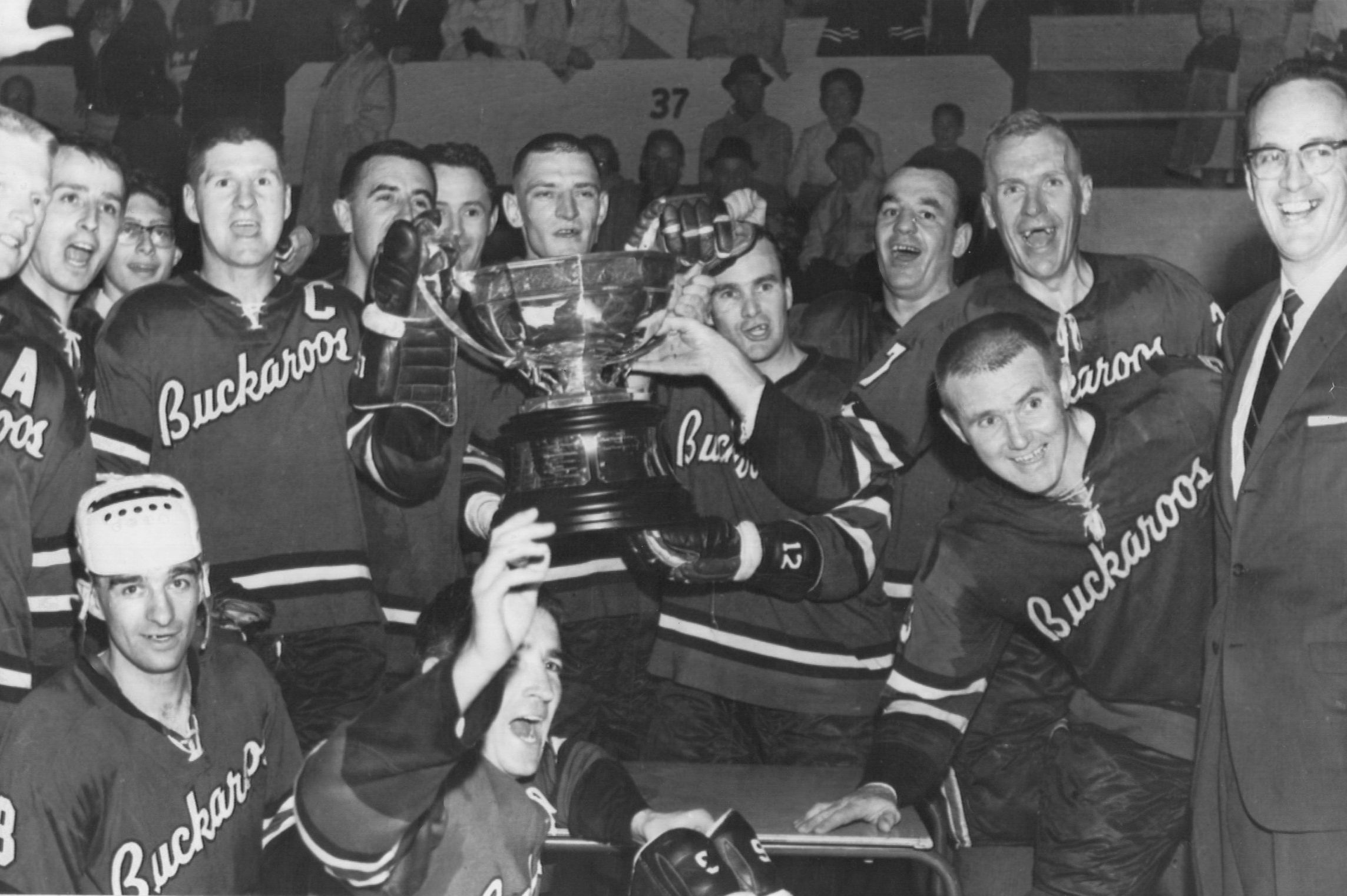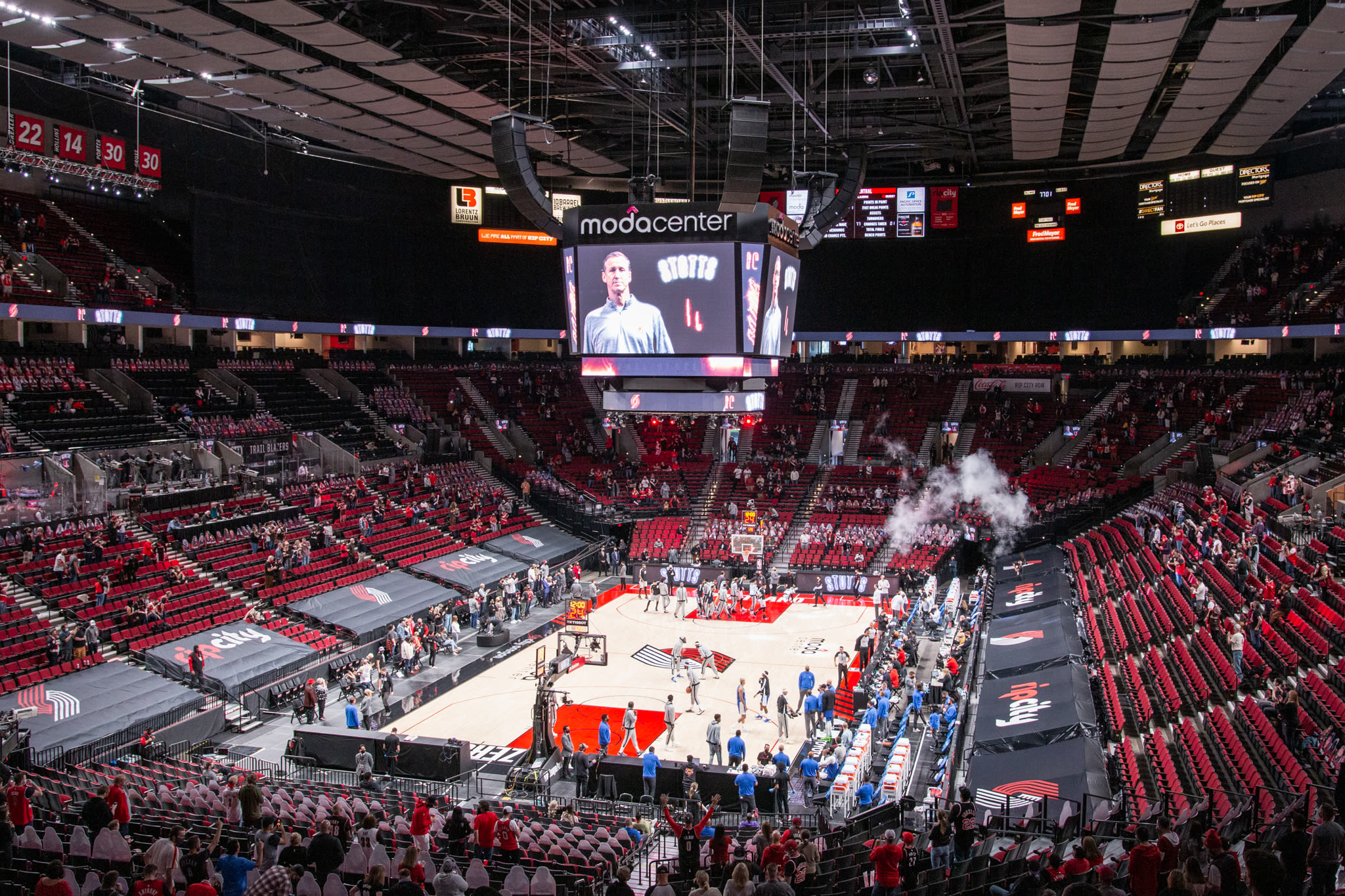
While the Moda Center Welcomes Back Fans, Stagehands Remain Benched
Header image: Inside the Moda Center on May 7, the first Trail Blazers home game with fans since March 2020. Photo by Gabriel Granillo.
At last Friday’s game against the Los Angeles Lakers, the first Trail Blazers home game at the Moda Center with a crowd, fans posed in front of the “Rip City” sculpture in front of the Essential Forces Fountain. They hovered over the “I” in “City” while someone else captured the moment on their cellphone. Television crews aimed their cameras at the oval building, and reporters talked about the historic nature of the night. Fans came equipped with signs, flags, and an energy that’s been lying dormant since the NBA canceled last year’s season, an energy that perhaps pushed the Blazers to a crucial win that overtook the Lakers for sixth seed.
Just outside the Rose Quarter, down a flight of concrete stairs over the Drexler parking lot, more people carried signs. Their signs read: “Shame on the Blazers” and “We Want to Work” and “Blazers unfair to loyal employees.” Dozens of people—Moda Center production and technical workers who operate sound, lights, stage design, and more—stood at a corner overlooking Pacific Highway, waving at passing cars and busses and trucks that honked in support, in front of a giant inflatable rat adorned with a Blazers jersey. “Oh, this? This is Scabby the Rat,” says Eric Cameron, a spotlight operator and relief worker at the Moda Center. He says that Scabby has been a mascot of sorts for trade unions, used in labor demonstrations in Boston, Philadelphia, New York—"all over." This Scabby is on loan from someone local, hovering over the “solidarity action,” as many at the demonstration would say, an effort to reclaim some of the jobs they lost when the pandemic shut down the live entertainment industry in March 2020. Jobs they say are theirs, but that their employer, Rip City Management, won’t give back.
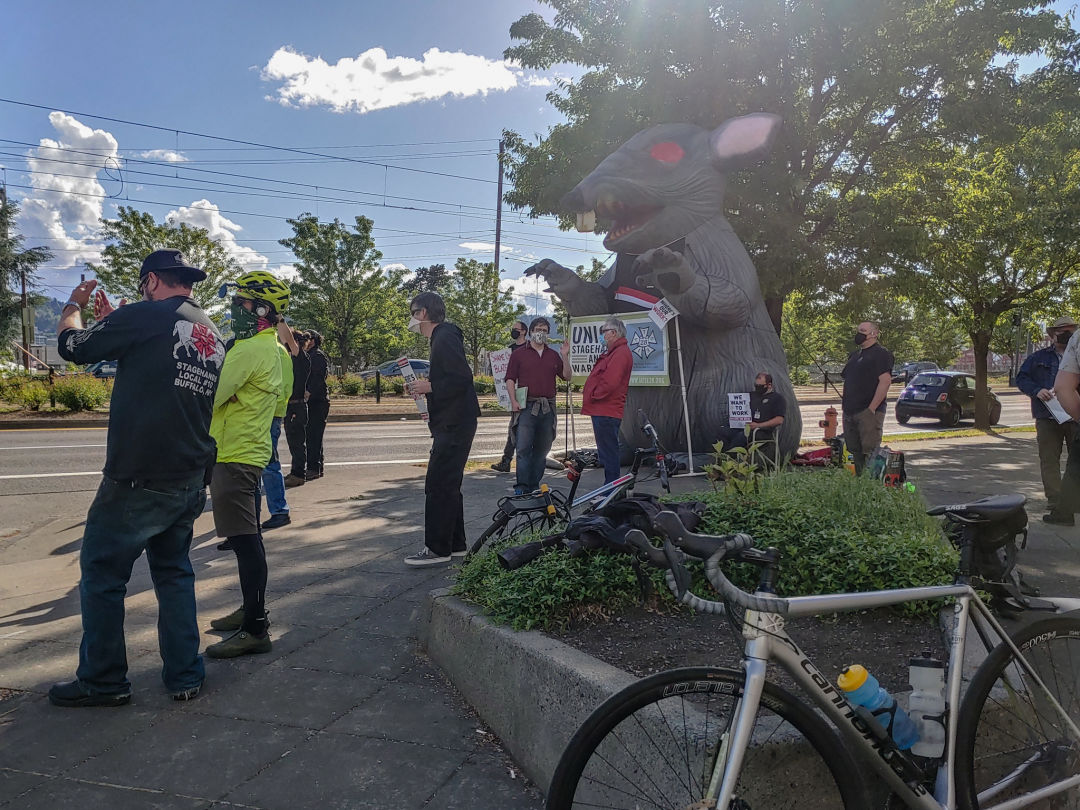
A solidarity action demonstration on May 7, with Scabby the Rat.
Image: Gabriel Granillo
“This was not the career that I ever thought I would get into, but now that I’m in it I love it to death,” Cameron says. “I was there for Dame’s shot, the 37-foot, wave goodbye. That is the loudest I have ever heard the Moda Center. In all the years I’ve been working here, all the concerts I’ve worked, I have never heard that place get that loud. It was deafening. And that was awesome. That was an awesome experience to have. Part of the reason I love the job.”
Cameron and the crew, some 60 people who work with the Moda Center for sporting events (Blazers and Winterhawks games), have been at these solidarity events since December 23 2020, when the Blazers started their regular season, with empty home games at the Moda Center. Because there wouldn’t be any fans at the home games, Rip City Management said their work wouldn’t be needed. So they’ve been here ever since, at every home game, asking for their jobs back, the jobs they’ve built their lives around and spent decades training in and committing to. And they’ve been at this with the help of the International Alliance of Theatrical Stage Employees, or IATSE, Local 28, a Northwest labor union that represents folks who work in theater, film, broadcast, and live events.
Now that the Blazers are hosting in-person games, albeit at 10 percent capacity, Rose Etta Venetucci, a business representative of IATSE, says they’re asking to return to the jobs they know exist and that they say Rip City Management is passing off to other people. It’s a small crew on rotation, Venetucci says, and that’s what’s so worrisome.
“That’s scary for a lot of [our workers]. It’s such a small amount of money, and those people have been there every game for years. It’s a slap in the face,” Venetucci says. “It’s hard, but it’ll be huge difference when we see those people back at work.”
Mick Boyt has been in the live entertainment business for about 40 years, working sound and lighting at various venues and bars in Portland. He says you’d be hard-pressed to mention a band from the ’80s or ’90s he hasn’t worked with. “Local bands, traveling bands, I did it all. All different aspects of the professions,” he says. But by the mid-’90s, the blue-eyed single father was looking for a more stable gig, something that could offer health insurance and a way to provide for his daughter. When the Moda Center opened to the public in 1995, Boyt was there for the opening day. He’s been there ever since.
Those same blue eyes now are weary after thirty-plus home games at the Moda Center this season, standing outside in the rain, wind, and snow, asking for his work back. Boyt has been here at the same corner almost every home game with the same sign. It reads "We Achieve More When We Work Together," something Damian Lillard said in commercials that were produced early in the pandemic. “And here we are,” he says. “Alone.”
“There’s a saying: ‘First in, last out.’ And that’s what I do for every concert and every show. I’m here when everybody else is at home. I’m here with the bands rehearsing and programming lighting and shows. I’m the one that sticks around. And here I am, locked out,” Boyt says.
Prior to the shutdown, Boyt says the flow of communication from Rip City Management was seamless. In many ways, he felt like part of family, working 16-hour days, growing, struggling, and achieving together. Now? “I’m just kind of hanging in limbo, you know, hoping the phone rings every day,” Boyt says. “Checking my email hundreds of times every day.”
Now that it’s seeming more apparent that the Blazers will make the playoffs, Boyt's heard that his and some of the other technical jobs may come back. But there’s no firm schedule, and nothing is set in stone.
“Every time you’re asked to do anything or be somewhere, you constantly show up, and you’ve never not fulfilled your end of the obligation. I’ve turned down work [before]. I could do weeklong shows in other places, and I’ve always turned them down if I had one Blazers game in the middle of that week because of my obligations,” Boyt says. “I just feel that I’ve dedicated myself, and so have my coworkers, to the team and to the management. And just to be dropped with nothing is really, kind of, hurtful.” He pauses a moment to wave at a bus driver honking his horn and giving a thumbs up, turns back and says, “I know it’s business, I guess.”
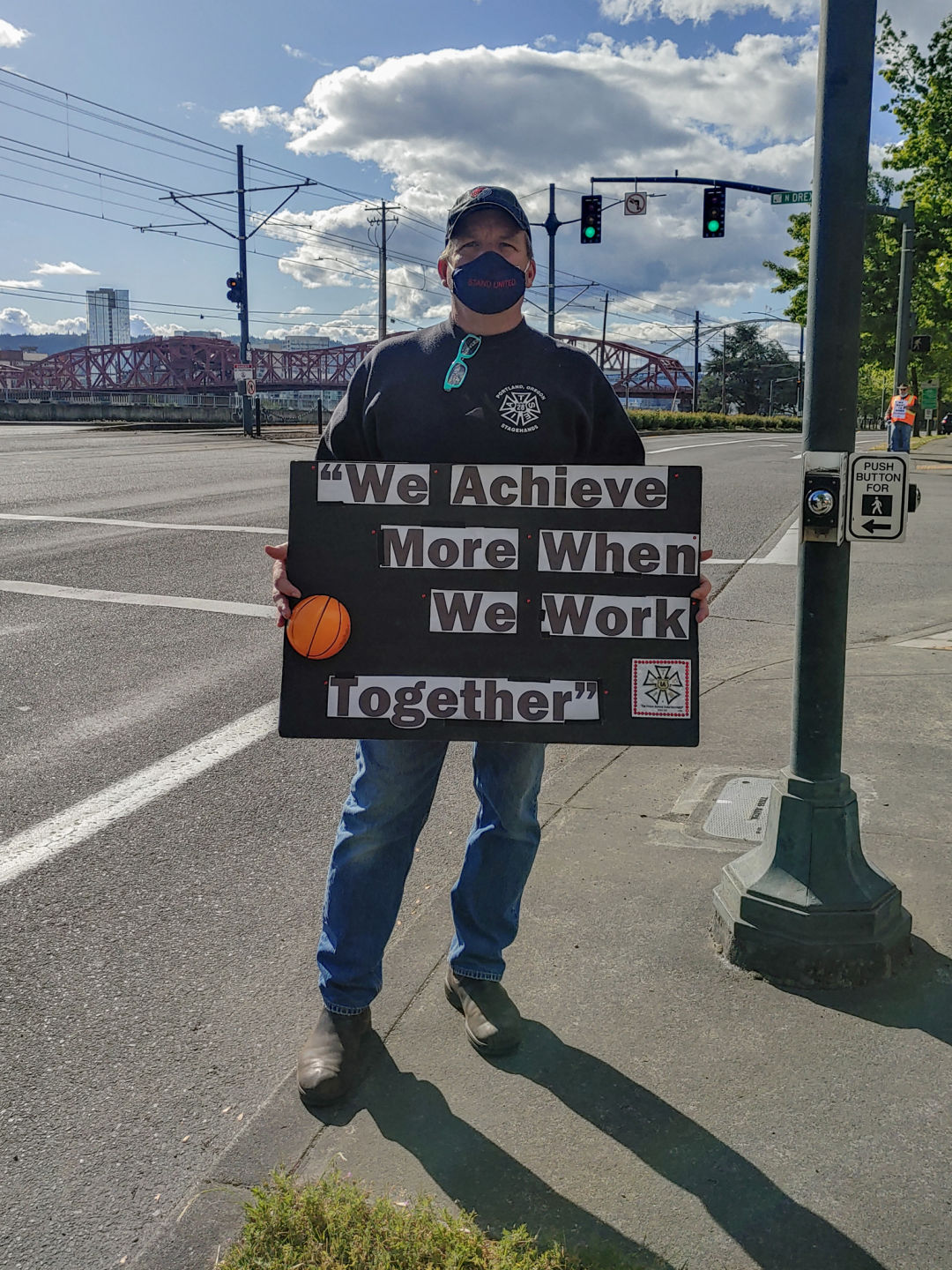
Mick Boyt
Image: Gabriel Granillo
Boyt and Cameron emphasize that their frustrations are not with the Blazers, not the team itself, but with Rip City Management. They eye the Moda Center with reverence, a temple full of shared experiences and memories, sold-out performances, unforgettable games. They were there to augment and enhance that experience, to be a part of a living memory.
“We’re waiting. We want to return to work. We don’t want to stand around. Fuck unemployment. We want to work. We want to do what we do,” Boyt says. “That’s why we do what we do, because we enjoy what we do.”
And it’s more than enjoyment. For many of the folks who end up in the live entertainment industry, this is the only work they’ve ever known.
Jay Spottswood, a local stagehand and president of IATSE, was born into the industry, spending much of his youth underneath the stage of his parents’ marionette show at the now-defunct San Jose amusement park Frontier Village. While his parents did puppeteer work, “they parked the kid under the stage,” Spottswood says. He got a “real job” in hospitality later in life, but ultimately ended up back underneath, behind, and on top of the stage. He’s had some work with the union after the shutdown, but he says it’s mostly been “crickets.” When the Oregon Employment Department asks Spottswood when he thinks he’ll be back to work, he usually says, “When we are allowed to have 3,000 people in a building together…. At 10 percent capacity, most of the theater companies—it’s similar to restaurants—they’re not making enough margin to be alive and make money.”
He and Summer Turpin, a fellow IATSE union member, A/V technician, and stagehand, swap stories outside the IATSE offices in Southeast Portland. Stories of navigating through unemployment and explaining to employers the amount of work that actually goes into the pre-production of any live performance. They share them like war veterans, laughing and cringing. It’s work that people don’t see, and therefore don’t really understand. “If we do our jobs correctly, you don’t know we’re there,” Turpin says. “The whole point is to make it look effortless for everyone else. But the amount of work that goes into making it look effortless is insane.”
They’d rather be 100 feet in the air, up in the rafters with a spotlight, or behind the stage, waiting with makeup for a wardrobe change than starting chants and talking to the press. There’s a reason they’re not on stage singing their hearts out. “That’s not who we are,” Turpin says. But for more than a year—436 days, Turpin is quick to point out—they’ve struggled to get by. Meanwhile, IATSE has set up donation funds, food giveaways, Fred Meyer gift cards, and food boxes for out-of-work stagehands.
The union has also been leading the effort to renegotiate the Collective Bargaining Agreement for workers at the Moda Center, which has an exclusion for sports. Venetucci says Rip City Management has always paid its workers under the CBA, and that this is the first time it has decided not to do that. After winning a hearing with the National Labor Relations Board in March, the workers voted April 1 on whether they would like to be represented by IATSE. The vote was unanimous: 53-0 in favor of representation. Now, Rip City Management is required to meet with IATSE on Friday, May 14, to renegotiate its contract. (Rip City Management denied a request for comment.) Venetucci says if they can get past this hurdle, it’s one step toward some sense of normalcy. “Because now it’s not just COVID keeping you home. This is an employer choosing to keep you home, which is horrifying.”
It’s also an indication that the live entertainment industry may soon come back. With signs that COVID-19 may be waning, there’s been word, Venetucci says, that the Portland Opera is planning some events. Portland Center Stage just announced its new season. The Symphony has done a few live streams and videos that put some stagehands back to work. “[Live entertainment] will come back,” Venetucci says. “But I think it’s going to be a while.”
As for what could help in the meantime? Venetucci says government assistance to help struggling event spaces and theaters, a revamped OED, and, of course, vaccinations.
“Our industry will rebound, but it’s going to rebound after everything. To my mind, I think we’ll be the last thing to come back. And that means we’re going to need find ways to keep ourselves sane until then,” Turpin says. “The rest of the world’s going to be coming back. It already is. People are getting vaccinated. Things are looking up. Things are opening up. Sometimes for better, sometimes prematurely. But we’re not there yet, and we’re not going to be there for quite some time.”
Update: Rose Etta Venetucci says Rip City Management is bringing workers back to provide lighting and projection effects during the upcoming Trail Blazers playoff home games.
